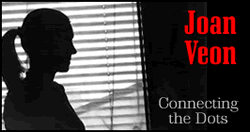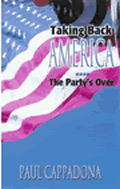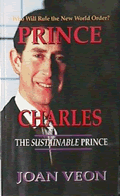Related
Articles:
Global Taxes Looming, Watch Your Wallet
Other
Veon
Articles:
US Leaders Highlight World Economic Forum Agenda
Global Taxation And Tax Harmonization
Does The
Global Economy Need a Global Currency?
REFORM THE U.N. BY ELIMINATING THE COMMONWEALTH
By
Joan Veon
May 18, 2005
NewsWithViews.com
The United Nations has been looking to take more and more ground since its inception in 1945. In the last 60 years it has added numerous organizations and commissions, including the World Health Organization, United Nations Environment Programme, UNICEF, and the World Trade Organization. Each of these has its own mandate and agenda. In 2000 at the UN Millennium Summit, the UN underwent what was considered the most significant facelift since its birth. Empowerments included: giving the General Assembly broader powers, giving the Secretary-General additional powers, providing for a �People�s Parliament� where the citizens of the world will elect their own representative to its own parliament. It was also given the right to form its own rapid deployment force of 42,000 troops, which was expanded to 75,000 troops at the 2004 G8 meeting in Sea Island, Georgia. Besides being given the right to find its own sources of financing, the UN presented its goals for the 21st century, which include reducing poverty, hunger, HIV/Aids, and child mortality. The annual cost is currently calculated at $50B a year and is expected to increase to $200B by 2015.
On December 2, 2004, a new report entitled, �A more secure world: our shared responsibility� the Report of the High-level Panel on Threats, Challenges and Change� was made public. Its recommendations go deeper and are more powerful than those of the Millennium Summit in 2000. At the heart of the UN�s recommendations is the concept of collective security. The report calls for a new security consensus, stating that �Today�s threats recognize no national boundaries, are connected, and must be addressed at the global and regional as well as the national levels.� The threats today are economic, social, inter-state conflict, internal conflict, nuclear, radiological, chemical and biological weapons, terrorism and transnational organized crime. Just look at the tsunami�UN Secretary General Kofi Annan said the South Seas disaster �was so huge that no one agency or one country can deal with it alone.� He was basically describing the whole concept of �integration� or �Collective Security� as a result of the 21st century terrorism that now orders the world. Terrorism is coupled with poverty, disease, famine, and natural disasters. In other words, we all have to work together to erase all kinds of problems because world borders are gone.
I agree that the UN needs to be reformed�more importantly, eliminated. However, the reality of that happening with a U.S. globalist congress is nil. So does the UN need to be reformed? Yes, but not in the way the Report on the Reform of the UN recommends.
Operating within the United Nations is the Commonwealth. The Commonwealth not only operates in the UN; it operates throughout the entire international infrastructure: The IMF/World Bank, the Group of Eight, the Group of Seven Finance Ministers, the World Trade Organization, the Free Trade Areas of the Americas, the European Union, the Bank for International Settlements, and the International Organization of Security Commissions.
The English word �Commonwealth� is from the 15th Century and indicates one of the following: a nation, state, or political unit; a state founded on law by agreement of the people for the common good; a republic and/or a federated union of constituent states. The Commonwealth of England was the official title of the political unit that replaced the kingdoms of Scotland and England under the rule of Oliver Cromwell. Kingdom and its former colonies.
According to Wikipedia.org, �The Commonwealth of Nations is a voluntary association of independent sovereign states, mostly formed by the United Kingdom and its former colonies.� Countries that �acknowledge the British monarch as head of state are known as Commonwealth Realms,� while all members recognize Queen Elizabeth II as Head of the Commonwealth.
The population of the Commonwealth is about 1.8B people or 30% of the world�s population. The land of Commonwealth countries equals about � of the world�s land area. The objectives of the Commonwealth were set down in the Haare Declaration of 1991. Interestingly enough, its goals are the same as those of the United Nations: international peace and order, global economic development, and the rule of international law. Acknowledging that many Commonwealth countries are poor and face acute problems, it further outlines: �Only sound and sustainable development can offer these millions the prospect of betterment. Achieving this will require a flow of public and private recourse from the developed to the developing world.�
For those countries that acknowledge the queen as head of state, the queen has a special representative in the country who is called governor-general. The governor-general retains all the reserve powers that the queen exercises in the UK, which includes opening, closing, and abolishing parliament. Furthermore, the governor-general appoints the Prime Minster and cabinet from the party with the most support from the House of Commons. In Canada, for example, the ten provinces all have a representative from the Queen. The Governor-General delivers the �Speech from the Throne� at the opening of parliament along with the speech from the prime minister.
When the UN was formed in 1945, Canada, New Zealand, and the United Kingdom had three votes. As the UK decolonized countries, they were made voting members of the United Nations. To see how they fared, between 1946-1959 they de-colonized four countries. Between 1960-1969, twenty more countries were de-colonized, and between 1970-1979, another ten more were decolonized. By the end of 1989, over 41 countries had been de-colonized. Every time a country was spun off, it received a vote at the UN and at any of the other international bodies they joined.
When you look at the free trade zone being set up in this hemisphere�the Free Trade Areas of the Americas�there are 13 countries that are Commonwealth members. Our neighbor to the north is our largest trading partner and is the largest Commonwealth member in this hemisphere. Our trade with Canada surpasses our trade with Japan. On a daily basis, the volume is over $1B a day or $400B a year. We import 80% of Canada�s wood, paper, and pulp, 17% of their oil, and 18% of their natural gas. Furthermore, we not only share energy grids all across the northern borders, but our New England states get most of their power from Quebec.
From a military standpoint, over the past 46 years America has been inextricably linked to Canada by our joint military efforts through the North American Aerospace Defense Command (NORAD). On September 11, 2001, it was a Canadian general who was holding the chair as NORAD gave the order to initiate our defenses.
It is interesting to note, with regard to the UN Millennium Goals, that 11 of 41 countries or 25% high indebted poor countries are Commonwealth countries. Of those countries, most of them are rich in mineral resources: Ghana has gold, bauxite, manganese, and diamonds; Guyana has bauxite, manganese, gold, and diamonds; Mauritania is rich in iron and copper ore; Senegal has petroleum refining; Sierra Leone has diamonds, chrome, and Bauxite; and Uganda has copper and cobalt. Tanzania is rich in gold, diamonds, and coal, while Zambia is rich in copper.
At the 2005 World Economic Forum I asked British Prime Minister Tony Blair, �I know what happened to America when we de-colonized, just look at us. Can you help me understand what happened to Africa when Britain de-colonized 41 countries between 1946-1989, when most of these in Africa are poor, poverty-stricken, and war torn?� After a few empty sentences, Mr. Blair acknowledged, �I know I haven�t answered the question the way you wanted me to.�
I find it fascinating that the U.S., who is a major funder and power mover in the United Nations, would allow the Commonwealth to operate inside the organization, and yet it has done so since its inception! While the Commonwealth says it is a voluntary organization, I asked a number of African delegates to the World Organization meeting in Cancun about leaving the Commonwealth and each one of them responded with the same look of fear and told me they could not.
Do the British still rule? Yes. The U.S. has one vote at the UN while the British have the potential of 54 votes. They have 45 at the IMF, 44 at the World Bank, 46 at the World Trade Organization, 2 in the Group of eight heads of State, 2 in the Group of Seven Finance Ministers, 28 at the International Organization of Security Commission, and 38 at the Bank for International Settlements.
Furthermore, every committee, agency, and organization at the UN has a rotating presidency, just like we see with the European Union and the Group of Eight heads of state. As such, what it means is that if there are four countries that are members of the Commonwealth on a particular committee, agency, or organization, they have the presidency 25% of the time.
The
only place where the Commonwealth does not hold the majority of votes
are at the Security Council. Should India and Australia, along with
Canada, be made permanent partners, Britain will have finally trumped
the U.S. and the world through the global system it helped create!
Bottom line: Get the Commonwealth out of the UN.
� 2005 Joan Veon - All Rights Reserved
Sign Up For Free E-Mail Alerts
E-Mails
are used strictly for NWVs alerts, not for sale
 Order
Joan Veon's book;
Order
Joan Veon's book;
"The
United Nations'
Global Straitjacket"
Joan Veon is a businesswoman and international reporter, having covered 64 Global meetings around the world in the last ten years. Please visit her website: www.womensgroup.org. To get a copy of her WTO report, send $10.00 to The Women's International Media Group, Inc. P. O. Box 77, Middletown, MD 21769. For an information packet, please call 301-371-0541
E-Mail: jveon@adelphia.net
When the UN was formed in 1945, Canada, New Zealand, and the United Kingdom
had three votes. As the UK decolonized countries, they were made voting
members of the United Nations.











